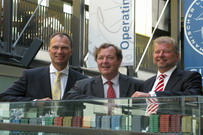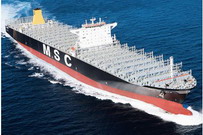GL’s Track of Innovation
——Interviewing with Doctor Hermann J. Klein, Executive President of Germanischer Lloyd (GL)
Journalist: Facing a very gloomy maritime market, how can GL still maintain an increase of sales revenues?
Hermann J. Klein: Indeed, the global financial crisis is a great challenge for the world maritime industry. People ask: How can the maritime industry maintain its competitive edge and what is the ultimate goal of shipyards and ship owners? The answer is the energy-saving vessels, whose competitive edge will last much longer. We will focus on R&D and innovation which will be the core factors for revenue increase.
In addition to diagram viewing, component inspection and technology approval for the maritime industry, we also concentrate on energy efficiency and environment protection. In our mind, there will be a large demand for consultancy service in these two service scopes. Why? In the long term, the fuel cost is still increasing, whether for the fluctuating petroleum price or for the more and more strict gas emission regulations. Therefore, we set up “Maritime Solution” Department to provide maritime consultancy, authentication, software and training service. These all-around service will help our customers to build and operate vessels not only economic but also environment-friendly.
Our another core service is industry service, in which we explores oil & gas as well as other equally-important renewable energies. In Aril, 2009, Noble Denton, the world-leading maritime and offshore technology service provider, was merged into GL, strengthening GL’s maritime engineering technology. In August, 2009, Garrad Hassan joined hand with GL to establish a renewable energy technology assurance and consultancy company.
Journalist: Many international shipyards stop their operation now and many ship owners hope to get a fully carrier with lower cost. How to pass this “Bottleneck Period” in your opinion?
Hermann J. Klein: Definitely I believe that opportunities are hidden behind challenges. I firmly believe that vessel efficiency can be a way out not only for us to overcome the current challenges but also the upcoming challenges in future. And vessel efficiency can be improved by improving energy efficiency and reducing operation cost.
Most of the vessels in the world are built or ordered when the oil price is at the level of 150 USD/per ton. And the general vessel life is about 25 years, so we must consider the oil price fluctuation and environment-related regulations during this lifetime. In the long run, the oil price is still rising, plus the rising of environment-related cost and the extra cost to limit sulfur and carbon dioxide emission, the shipping companies are facing the pressure of increasing cost. In 2020, the fuel cost per ton will reach USD 900, which will possibly be increased to USD 2000 in Year 2037.
Since energy efficiency is very important, now there are plenty of pleasures to reduce the fuel cost for newly built and used vessels. GL can help customers in a cost-efficiency solution with its specialty in hull and engine design as well as its technology in analyzing hull and engine performance. In addition, we also help customers in reducing vessel maintenance cost.
As a classification society, we bear the responsibility of helping ship owners and liners in building and operating their vessels more efficiently to maintain their marketing edge.
Journalist: As we know, technological innovation is always redeemed as the golden key for enterprise. What achievements have GL made in its technological innovation?
Hermann J. Klein: GL makes specifications for innovation design to ensure the compatibility between security and environment in the world maritime industry.
“MSC Daniela” container vessel well embodies our innovation in vessel design. This vessel not only meets the demands in dodger visibility so that no capacity is wasted, but also fulfills the international specification on bunker protection much earlier before its valid date. Considering the fact that more and more shipyards expand their service to marine engineer, GL also make a new specification in building of more secure and more stable vessels to reducing the operation risk. GL also specifies carbon dioxide index, which is a practical tool to measure the carbon dioxide emission for us to finally reduce the emission.
With deepening technological development, GL puts its strength on implanting computer technology and simulation technology in building vessels. And the simulation-based design is replacing the tradition experience-based design. The related service in this regard is mainly provided by two companies, which are FRIENDSHIP SYSTEMS and FutureShip.
FRIENDSHIP SYSTEMS is the first company in the world to perform function simulation design by tightly coupling modeling and simulation. In 2007, this company promoted an engineering software named FRIENDSHIP-Framework, which can help customers in improving energy efficiency by its excellent design and optimization of hull, propeller, turbo, pump and other devices. This advanced software has entered the market now and some new features and functions will be added later.
Journalist: GL has distinguished itself in reducing operation cost and environment harm for the maritime industry. Can you say some details about this?
Hermann J. Klein: It is at the stage of building a new vessel that GL can explore the energy-saving potential. Therefore shipyards play an important role in building energy-saving vessels. When designing a new vessel, the oil price fluctuation and the continuously increasing oil price in the future 25 years must be considered. The specific measures should be taken in every links including ship type, hull structure, panel, propeller, engine and so on.
While for the on-use vessels, the improvement can be made in vessel cost category, seafarer operation mode, onboard energy consumption management, shipping speed and loading coefficient optimization. As I always said, the increasing fuel cost makes vessel efficiency Very crucial.
Foreseeing is required in decision-making. Taking the container vessel as example, small super-Panama is the latest trend for design. Its standard container capacity is similar with the latest Panama type, however, its operation cost is greatly lowered and it cost less ballast water, which result in rising of efficiency.
Journalist: Asia, especially China, is given much more spotlight than Europe and America in this financial crisis. What is your overview of China maritime market and what kind of cooperation points between GL and China enterprises?
Hermann J. Klein: China economy is a parameter of world economy to a great extent. China economy growth is well shown in its maritime industry. China shipbuilding industry has been in the top rank in the world and China shipbuilding enterprises make rapid progress in operation, technology and innovation so that they can produce high-quality vessels. Shipbuilding industry has become one of the pilot industries in China and the recently approved shipbuilding industry renovation plan will facilitate the shipbuilding industry to further improve their competitive edge and innovation degree.
As to the cooperation, how to make vessels and shipping more secure, more advanced and more environment-friendly is a big subject, which require the cooperation and joint effort of the total maritime industry. China should play an important role in designing and building innovative and energy-saving vessels.
GL is dedicated to serve the China shipbuilding industry. GL’s Asia & Pacific headquarters is located in Shanghai, which is China’s important shipping center. Now some China shipyards are expanding their service to the maritime engineering industry and are on the road to diversification. We will continue to provide support to these shipyards with our specialty in maritime engineering.
Journalist: Now “New energy” is a key word in the world development. How can you evaluate the role of new energy in vessel efficiency?
Hermann J. Klein: Since the whole world is challenged by the climate change, now “energy saving and emission reduction” is given much emphasis. The maritime industry is no exception. Undoubtedly, new energy will facilitate the vessel efficiency. For example, natural gas is regarded as a replaceable fuel which has less adverse effect to the environment. One GL study shows that the natural gas-driven vessels not only give less emission but also cause less operation cost.
Another new energy studied by GL is fuel battery. Actually, this research was begun as early as in the middle of 1980s. GL is the first classification society to self-formulate the fuel battery use guideline. The projects authenticated by us include one inland hydrogen-driven yacht, one fuel battery-driven tourist vessel and hydrogen engine device used in a whale-watching vessel.
GL also actively participated in the analysis of submarine fuel battery. Fuel battery can increase 10 submarine enduring coefficients. As the first-class classification society in the world, GL promulgated vessel fuel battery use guideline in Year 2003 and practiced some authentication accordingly. Although hydrogen fuel battery is still not used in large vessels, there is no long time before this. In the upcoming 5 years the ocean vessel-used fuel battery with 500KW per set will be researched out. The available energy of the fuel battery system can meet most vessels’ demand for ancillary electric power. For example, one ROPAX passenger ro/ro vessel can obtain 1.5~2MW constant-voltage ancillary power engine from all equipped ancillary powers, which can be provided by 3 to 4 large fuel batteries.
The biggest problem of the fuel battery is the sulfur accompanied in hydrogen transfer. You know, sulfur must be eliminated before the hydrogen enters the fuel battery because it will cause great damage to the fuel battery. The hydrogen in the liquefied natural gas doesn’t contain sulfur because the sulfur is eliminated during the liquefying process.
The hydrogen obtained from electrolyzed water also does not contain hydrogen. In the long run, hydrogen is the technology to be used definitely.



